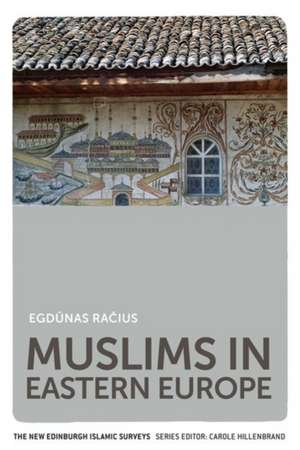Muslims in Eastern Europe: The New Edinburgh Islamic Surveys
Autor Ra&en Limba Engleză Paperback – 15 ian 2018
| Toate formatele și edițiile | Preț | Express |
|---|---|---|
| Paperback (1) | 184.14 lei 3-5 săpt. | |
| EDINBURGH UNIVERSITY PRESS – 15 ian 2018 | 184.14 lei 3-5 săpt. | |
| Hardback (1) | 610.35 lei 6-8 săpt. | |
| EDINBURGH UNIVERSITY PRESS – 20 dec 2017 | 610.35 lei 6-8 săpt. |
Din seria The New Edinburgh Islamic Surveys
- 10%
 Preț: 196.29 lei
Preț: 196.29 lei - 11%
 Preț: 185.47 lei
Preț: 185.47 lei - 11%
 Preț: 184.59 lei
Preț: 184.59 lei - 10%
 Preț: 185.93 lei
Preț: 185.93 lei - 10%
 Preț: 188.20 lei
Preț: 188.20 lei - 10%
 Preț: 191.67 lei
Preț: 191.67 lei - 11%
 Preț: 191.38 lei
Preț: 191.38 lei - 9%
 Preț: 197.70 lei
Preț: 197.70 lei - 10%
 Preț: 194.37 lei
Preț: 194.37 lei - 18%
 Preț: 643.86 lei
Preț: 643.86 lei - 18%
 Preț: 615.57 lei
Preț: 615.57 lei - 11%
 Preț: 190.75 lei
Preț: 190.75 lei - 18%
 Preț: 645.73 lei
Preț: 645.73 lei - 10%
 Preț: 192.22 lei
Preț: 192.22 lei - 18%
 Preț: 641.74 lei
Preț: 641.74 lei - 18%
 Preț: 642.50 lei
Preț: 642.50 lei - 17%
 Preț: 650.21 lei
Preț: 650.21 lei - 18%
 Preț: 636.48 lei
Preț: 636.48 lei -
 Preț: 134.60 lei
Preț: 134.60 lei
Preț: 184.14 lei
Preț vechi: 206.44 lei
-11% Nou
Puncte Express: 276
Preț estimativ în valută:
35.24€ • 38.26$ • 29.60£
35.24€ • 38.26$ • 29.60£
Carte disponibilă
Livrare economică 01-15 aprilie
Preluare comenzi: 021 569.72.76
Specificații
ISBN-13: 9781474415798
ISBN-10: 1474415792
Pagini: 200
Dimensiuni: 155 x 234 x 13 mm
Greutate: 0.3 kg
Editura: EDINBURGH UNIVERSITY PRESS
Seria The New Edinburgh Islamic Surveys
ISBN-10: 1474415792
Pagini: 200
Dimensiuni: 155 x 234 x 13 mm
Greutate: 0.3 kg
Editura: EDINBURGH UNIVERSITY PRESS
Seria The New Edinburgh Islamic Surveys
Notă biografică
Egdunas Racius is a Professor of Islamic studies at Vytautas Magnus University (Kaunas, Lithuania). He is the Reviews Editor of the Journal of Muslims in Europe and a co-editor of the Yearbook of Muslims in Europe.
Cuprins
List of tables, boxes and maps; Glossary of Islamic terms; Foreword and acknowledgements; 1. Autochthonous Islam of Eastern Europe - populations, practices, institutions; 2. Historical overview: Mongol-Tatar invasion of Eastern Europe and its consequences, Russian possessions in Eastern Europe and its Muslim population, Ottoman possessions in South-Eastern Europe; 3. North-Eastern Europe: The Union of the Soviet Socialist Republics and its legacy, Russia, Ukraine, The Baltic States, Belarus, Moldova; 4. Successor states of Yugoslavia: The Socialist Federal Republic of Yugoslavia and its legacy, Bosnia and Herzegovina, Montenegro and Serbia, Kosovo, Macedonia, Slovenia and Croatia; 5. South-Eastern Europe: Albania, Bulgaria, Romania; 6. Central Europe: Poland, Hungary, The Czech Republic and Slovakia; 7. Islam in Eastern Europe, Eastern European Islam: new faces, the new challenges; 8. Considering the other side; Bibliography.
Descriere
Provides an overview of the history and current trends in Muslim communities in 21 post-Communist Eastern European countries.
